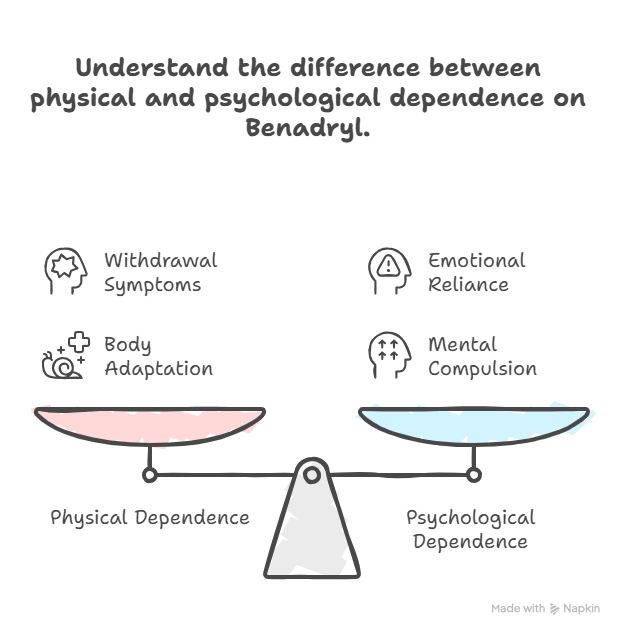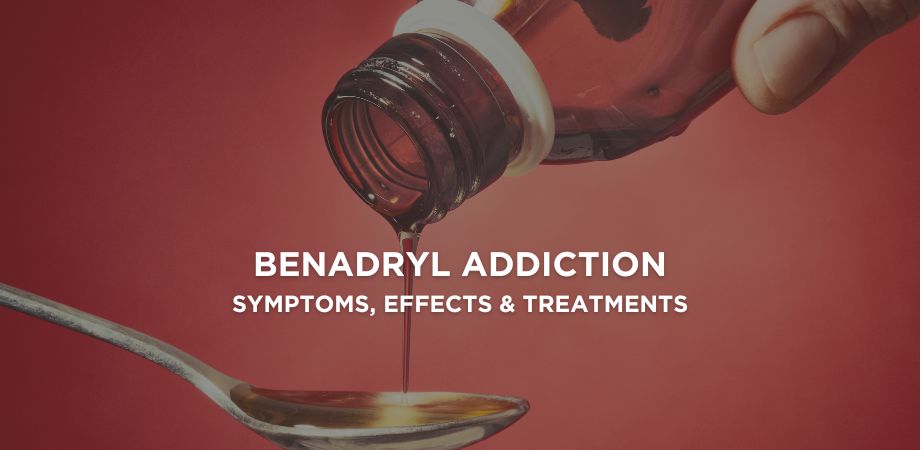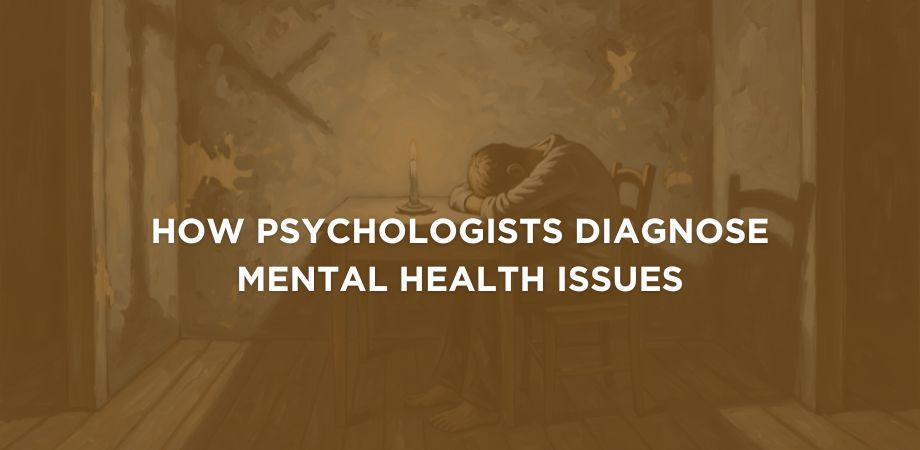Introduction
Benadryl (diphenhydramine) is one of the most common antihistamines used in India to treat allergies, cold symptoms, and motion sickness. It works by blocking histamine, a natural substance that triggers allergic reactions, and also causes mild sedation, which is why many people use it to help with sleep. While Benadryl offers quick relief and is easily available without a prescription, its sedative effects can lead to misuse when taken too often or in higher doses than advised.
This blog discusses in detail the therapeutic use and dependency risk of Benadryl addiction. It explains how Benadryl misuse can develop, the signs and symptoms to look out for, and the factors that increase vulnerability, such as long-term use, mental health issues, and easy over-the-counter access. You’ll also learn about safe use practices, medical supervision, and evidence-based treatment options for dependency.
Awareness helps prevent dependency, promotes responsible medication habits, and encourages early intervention when misuse begins. Let’s look deeper into how this common allergy medicine can become a source of hidden risk and how to use it safely.
What Is Benadryl?
Benadryl, known generically as diphenhydramine or cough syrup, is a first-generation antihistamine that helps relieve symptoms of allergies, motion sickness, and occasional insomnia. As one of the oldest antihistamines still in use, it remains a trusted choice for managing allergic reactions such as sneezing, itching, watery eyes, hives, and a runny nose. Because of its sedative properties, it is sometimes used short-term to promote sleep, particularly when nighttime allergies cause discomfort.
Benadryl belongs to the first-generation H1 receptor antagonist class of medications. It works by blocking histamine, a natural chemical released during allergic responses, from binding to H1 receptors in the body. When histamine attaches to these receptors, it triggers inflammation, itching, and other allergy symptoms. Diphenhydramine prevents this binding, thereby reducing allergic discomfort within a short period after intake.
However, unlike newer second-generation antihistamines, Benadryl easily crosses the blood–brain barrier. Once inside the brain, it blocks central histamine receptors, which suppresses alertness and causes drowsiness. This sedative effect explains why the medication is occasionally used as a nighttime sleep aid, though long-term use for insomnia is not recommended.
In India, Benadryl is available in both tablet and syrup forms. The tablet form is typically used for allergies or sleep, while the cough syrup combines diphenhydramine with ammonium chloride and sodium citrate to relieve cough and cold symptoms. Because these formulations serve different purposes, users should always check labels before consumption.
A well-known clinical study by Kay et al. (1998) compared diphenhydramine to newer antihistamines like fexofenadine and found that diphenhydramine significantly impaired driving performance and alertness, more than even moderate alcohol consumption. This study highlights the need for caution when taking Benadryl, especially before driving or operating machinery.

Can Benadryl Be Addictive?
Benadryl (diphenhydramine) is not classified as an addictive drug in the same way as opioids or benzodiazepines. Research shows that dependency and misuse can occur, especially when the medication is used frequently for its sedative or calming effects. Many people begin taking Benadryl for allergies or sleep, but over time, regular use can lead to psychological reliance and, in some cases, withdrawal symptoms when trying to stop.
Understanding Dependence vs. Addiction
There’s a clear difference between dependence and addiction:
- Physical dependence occurs when the body adapts to the presence of a substance, and stopping it causes withdrawal symptoms such as restlessness, sweating, or insomnia.
- Psychological addiction happens when a person feels emotionally or mentally compelled to take the drug for its effects, such as calmness, sedation, or mild euphoria.
With Benadryl, psychological dependence is more common. People may start to believe they “can’t sleep without it” or need it to feel relaxed at night. This form of reliance is subtle but can gradually interfere with natural sleep cycles and daily functioning.
Scenarios That Lead to Misuse of Benadryl
Benadryl misuse often begins unintentionally. Common patterns include:
- Using it nightly as a sleep aid instead of treating the root cause of insomnia.
- Increasing the dose over time to achieve the same sedative effect due to tolerance.
- Combining it with alcohol or other sedatives to enhance its calming or euphoric sensation.
- Recreational use, particularly among teens or young adults, is to experience mild hallucinations or detachment at high doses.
While most people use Benadryl safely for short-term allergy or travel-related symptoms, habitual use should always be avoided. Individuals who feel dependent on it for sleep or relaxation should seek medical advice if some severe signs appear.
Signs and Symptoms of Benadryl Misuse
Benadryl misuse often starts by using it for seasonal allergies or occasional sleeplessness. Over time, as tolerance builds, people start taking larger doses or using it more frequently than recommended. Gradually, Benadryl dependence develops, forcing the mind and body to rely on sedative effects to relax or fall asleep.
In India, where Benadryl syrups and tablets are readily available over the counter, this risk increases due to easy accessibility and self-medication habits. Recognizing the warning signs early is essential to prevent deeper dependency and associated health risks.
Below are some common indicators and symptoms that may suggest Benadryl misuse or dependency. These signs can appear gradually and may vary from person to person depending on dose, frequency, and overall health.
Indicators of Misuse
People misuse Benadryl often:
- Take higher-than-recommended doses to feel sleepy or calm.
- Use it more often than advised, sometimes daily or several times a day.
- Combine it with alcohol or sedatives to enhance its tranquilizing effect.
- Keep multiple bottles or hide usage from family or friends.
- Experience restlessness or anxiety when they skip a dose.
These patterns point to behavioral dependence. A person may not recognize the shift from casual use to reliance, but these habits often indicate psychological attachment and potential misuse that requires clinical attention.
Physical Symptoms of Misuse
Common physical signs include:
- Extreme drowsiness or sluggishness during the day.
- Dry mouth, blurred vision, or constipation from anticholinergic effects.
- Rapid heart rate or palpitations at higher doses.
- Confusion, impaired coordination, or slowed reactions.
- In severe cases, hallucinations or urinary retention may occur.
These symptoms reflect diphenhydramine’s sedative and anticholinergic impact on the nervous system. When used beyond therapeutic doses, its effects extend from mild sedation to toxic neurological responses, signaling potential overdose or chronic misuse.
Psychological and Behavioral Signs
Individuals struggling with Benadryl misuse may:
- Feel they cannot sleep without taking it.
- Use it to cope with stress, anxiety, or emotional discomfort.
- Become secretive about their usage patterns.
- Show irritability or anxiety when unable to access the drug.
- Neglect responsibilities due to fatigue or cognitive dullness.
These behaviors represent emotional dependency and loss of control. The drug becomes a psychological comfort, masking deeper issues such as anxiety, insomnia, or trauma. Addressing the underlying cause rather than only the symptom is crucial for recovery.
Risk Factors for Benadryl Addiction
Certain factors make individuals more prone to developing dependency on Benadryl (diphenhydramine). The most significant is chronic or long-term use, especially when the medication is taken daily for sleep or stress relief. Gradually, the body adapts to its sedative effects, leading to tolerance and increased dosage needs.
People with a history of substance use, such as alcohol or prescription sedatives, are at higher risk because their brain’s reward pathways are already sensitive to calming substances. Similarly, those with mental health conditions like anxiety, depression, or insomnia may turn to Benadryl as an easy self-medication tool, finding short-term relief but increasing the risk of psychological dependence.
Key risk factors include:
- Frequent or high-dose use for sleep or emotional comfort.
- History of addiction or substance misuse.
- Untreated mental health disorders, especially anxiety or insomnia.
- Easy over-the-counter access leading to self-medication.
- Combining Benadryl with alcohol, opioids, or sedatives heightens the risk of respiratory distress or overdose.
As Benadryl is widely available in India, misuse often goes unnoticed. Recognizing these risk factors early and seeking medical or psychological guidance can prevent dependence and support safe, responsible use.
Managing and Preventing Benadryl Misuse
Preventing Benadryl (diphenhydramine) misuse begins with awareness and responsible use. Due to the easy access over the counter in India, many people underestimate its potential risks. Following the correct dosage and understanding when professional guidance is needed are the most effective ways to use Benadryl safely without developing dependence.
Importance of Medical Guidance
Always follow the recommended dosage on the label or as advised by a doctor. Benadryl should only be used short-term for allergies, cold, or motion sickness relief. If symptoms persist beyond a few days, it’s important to consult a healthcare professional instead of increasing the dose. Continuous self-medication, even with non-prescription drugs, can lead to tolerance and psychological reliance.
What Are the Strategies for Safe Use?
To minimize the risk of misuse, individuals should:
- Use Benadryl only when necessary and avoid daily reliance for sleep.
- Avoid combining it with alcohol, opioids, or sedatives.
- Consult a doctor if insomnia or anxiety persists, as these may indicate underlying issues.
- Read labels carefully, especially when buying cough syrups that contain diphenhydramine.
- Store medication safely, out of reach of children or anyone prone to substance misuse.
Steps to Address Suspected Misuse
If misuse is suspected, early intervention is crucial:
- Seek medical evaluation to assess dependency or side effects.
- Gradually reduce dosage under medical supervision rather than stopping abruptly.
- Consider behavioral therapy or counseling to address emotional reliance on the drug.
- In severe cases, rehabilitation programs can help manage withdrawal and rebuild healthy habits.
At Alpha Healing Center, our medical specialists help individuals safely overcome dependency on OTC medications through personalized care, holistic therapy, and medical supervision, empowering lasting recovery and balanced well-being.
Treatment Options for Benadryl Dependency
Treating Benadryl dependency requires a structured plan under medical and psychological guidance. The main goal is to safely stop the drug, manage withdrawal symptoms, and rebuild healthy sleep and emotional habits. Recovery is most effective when supervised by professionals who understand both the medical and behavioral aspects of antihistamine misuse.
1. Medical Supervision and Detoxification
The first and most important step in treating Benadryl dependency is medical supervision. Stopping the drug abruptly can trigger withdrawal symptoms such as anxiety, restlessness, sweating, or insomnia. Under a doctor’s care, the process involves:
- Gradual dose reduction (tapering) to minimize withdrawal discomfort.
- Medical monitoring to track heart rate, hydration, and sleep quality.
- Medication support, if needed, to stabilize mood and manage anxiety.
In some cases, individuals who have been using high doses for long periods may require short-term inpatient detoxification, especially if withdrawal symptoms interfere with daily functioning.
2. Psychological and Behavioral Therapy
Addressing the emotional triggers behind Benadryl misuse is essential for lasting recovery. Through therapy, individuals learn healthier ways to manage these challenges. Common evidence-based approaches include:
- Cognitive Behavioral Therapy (CBT) – helps identify negative thought patterns and replace them with balanced, healthy coping strategies.
- Sleep hygiene education – teaches natural sleep techniques, such as maintaining a regular bedtime, avoiding stimulants, and using relaxation exercises.
- Motivational interviewing – builds personal motivation and readiness to change, especially when denial or shame are barriers to treatment.
At Alpha Healing Center, these therapies are personalized, focusing on the root emotional causes of misuse while helping clients rebuild confidence and self-control.
3. Ongoing Support and Aftercare
Continuous support helps prevent relapse and strengthens long-term stability. Recommended support options include:
- Individual counseling or group therapy to share experiences and maintain accountability.
- Addiction specialists and psychiatrists for co-occurring mental health treatment.
- Support groups such as Narcotics Anonymous (NA) or local wellness communities for peer encouragement.
- Family therapy helps loved ones understand the recovery process and offer constructive support.
Our treatment methods at Alpha to overcome this dependency include medical care, counseling, mindfulness, and holistic healing. We guide individuals toward complete recovery and help them rediscover natural sleep, mental clarity, and long-term balance by addressing their symptoms and concerns.
Myths and Facts About Benadryl Addiction
People assume that OTC medicines like Benadryl (diphenhydramine) are harmless because they don’t require a prescription. This misconception often leads to misuse and dependency. Understanding the truth behind these myths is essential to promote responsible use and prevent self-medication risks.
Common Myths and Facts
- Myth 1: “Over-the-counter drugs can’t be addictive.”
Fact: Even though Benadryl is non-prescription, it affects brain chemistry. Long-term or excessive use can lead to psychological dependence and withdrawal symptoms similar to those caused by prescription sedatives. - Myth 2: “It’s safe to use Benadryl every night for sleep.”
Fact: Regular nightly use builds tolerance. Over time, the sedative effect weakens, prompting higher doses. This pattern often leads to dependency and sleep cycle disruption. - Myth 3: “Benadryl misuse is harmless compared to other addictions.”
Fact: Chronic misuse can cause serious side effects like memory issues, confusion, and heart rhythm disturbances, and even overdose—especially when combined with alcohol or other depressants. - Myth 4: “Admitting dependence on OTC medicines is shameful.”
Fact: Dependency on non-prescription drugs is a medical issue, not a moral one. Seeking help early prevents complications and promotes faster recovery.
At Alpha Rehab Center, we emphasize awareness and education to break these myths, helping individuals seek timely treatment and build a safe, informed relationship with medications.
Conclusion
Benadryl (diphenhydramine) is an effective antihistamine when used correctly, but its sedative effects make it prone to misuse and dependency when taken in excess or for the wrong reasons. Regular or unsupervised use, especially as a sleep aid, can lead to tolerance, withdrawal, and psychological reliance. Recognizing early signs of misuse, such as frequent dosing, secrecy, or emotional dependence, is vital to prevent long-term harm.
Responsible use starts with following medical advice, using the drug only when needed, and seeking professional help for persistent insomnia, anxiety, or allergy issues.
If you or someone you care about is struggling with dependency on Benadryl or any over-the-counter medication, support and recovery are possible.
At Alpha Healing Center, we provide compassionate, evidence-based treatment for medication misuse and dependency. Our holistic programs combine medical care, therapy, and wellness practices to help individuals regain balance and live free from substance reliance.
Reach out today to begin your journey toward lasting recovery and a healthier, medication-free life.





